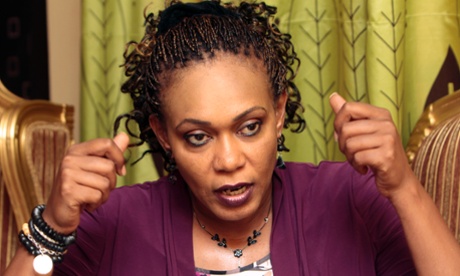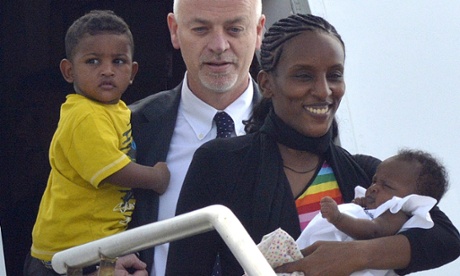Human Rights of Women
Source: The Guardian
Human rights abuses entrenched in legal system, with women facing flogging or jail for going about their daily lives
Amira Osman Hamed knows better than most how Sudan's so-called morality laws can make life a nightmare for women in her country.
A civil engineer, Osman faced a public flogging after her arrest by 10 police officers last year for falling foul of a catch-all provision barring "indecent dressing" because she failed to cover her hair.
She was spared a lashing only after a global outcry and now Osman and other women's rights activists are hoping to gain international support to overturn Sudan's public order laws. Rights campaigners say these laws are arbitrarily enforced and used as cover to oppress vulnerable groups, particularly women, who face long spells in jail for infractions such as dancing with men or operating a hair salon before the age of 35.
"The laws in Sudan are founded on a 'women-are-the-devil' mentality," Osman said. "In my country women are punished on a daily basis on grounds of their dress, the time they get back home and other alleged transgressions."
Osman was speaking in Nairobi at the launch of a new report into the human rights in Sudan by the London-based Equal Rights Trust, in partnership with the Sudanese Organisation for Research and Development. The repost accuses the government of widespread rights violations, many of which are entrenched in law.
"Since 1989, [President Omar] al-Bashir has sought to degrade and diminish the country's immense diversity in favour of a narrow vision of Sudan as a singularly Arab, Islamic, and male-dominated country. In so doing, the government has institutionalised discrimination on the basis of religion, ethnicity, political opinion, gender and sexual orientation, it says."
 Amira Osman Hamed faced being flogged for not covering her hair. Photograph: Ashraf Shazly/AFP
Amira Osman Hamed faced being flogged for not covering her hair. Photograph: Ashraf Shazly/AFP
The report, In Search of Confluence – Addressing Discrimination and Inequality in Sudan, relied on oral testimonies from 260 people and an analysis of the state's laws.
Equal Rights Trust executive director Dimitrina Petrova said the number of government critics, including journalists, who had been detained was one of the most striking findings.
She said she started keeping count of detentions after she noticed the repeated "casual" mentions of experiences in prison by the people she interviewed for her research.
"The result was that out of 60 civil society activists that spoke to us, only five had not been arrested in the last three years in connection of their work," she said.
 Meriam Ibrahim with her daughter Maya, Italian deputy foreign minister Lapo Pistelli and her son, Martin,
Meriam Ibrahim with her daughter Maya, Italian deputy foreign minister Lapo Pistelli and her son, Martin,
after leaving Sudan for Italy before moving to the United States. Photograph: Daniele Leone/AP
The report highlights discrimination across a wide range of areas covering race, ethnicity, political opinion, disability and health status, and claims to offer the first testimony from Sudan's gay community, which it notes is severely oppressed.
Activists say women bear a disproportionate burden of abuses in what is a highly patriarchal society.
Osman said that in 2012, according to official statistics, 70% of the 43,000 cases sent to the public order courts involved women, and that eight out of every 10 women charged were drawn from vulnerable groups including those internally displaced by civil war.
In a recent high-profile case, a Sudanese woman, Meriam Ibrahim, was sentenced to death for converting from Islam to Christianity before she was eventually allowed to leave the country into exile.
Bashir has ruled Sudan for 25 years after taking power in a coup. He has maintained a close hold on authority through his control of the ruling National Congress Party and the security forces.
The Sudanese president, who has been charged with war crimes in Darfur by the international criminal court, has come under increasing pressure following the secession of oil-rich South Sudan in 2011.
Rising levels of inflation and multiple armed insurrections have weakened the regime in Khartoum but women's rights activists say they will keep up the fight for change and for the overturning of repressive laws.
"We must come together, inside and outside Sudan, to exert pressure on the government to repeal these laws that targets and humiliate women and to cancel laws that are contradictory to the constitution and international and regional treaties and covenants," said Osman.
